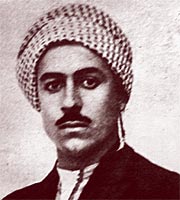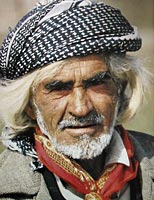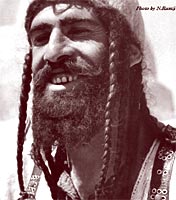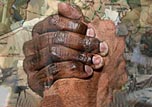Although the data are not absolutely reliable, the government estimates
that 76 percent of the people are Arab; 19 percent are Kurds; while
Turkomans, Assyrians, Armenians, and other relatively small groups make up
the rest. All but a small percentage adhere to Islam. The Islamic
component is split into two main sects, Sunni and Shia, with the Shias by
far the majority. Officially the government sets the number of Shias at 55
percent. In the 1980s knowledgeable observers began to question this
figure, regarding it as low. Because the government does not encourage
birth control and the Shias, the least affluent in society, have
traditionally had the highest birthrate, a more reasonable estimate of
their numbers would seem to be between 60 and 65 percent. All but a few of
the estimated 3,088,000 Kurds are Sunni, and thus the Sunni Arabs--who
historically have been the dominant religious and ethnic group--
constitute a decided minority vis-à-vis the Shia majority.
Arabs:
 Almost all Iraqis speak at least some Arabic, the mother tongue for the
Arab majority. Arabic, one of the more widely spoken languages in the
world, is the mother tongue claimed in 1988 by over 177 million people
from Morocco to the Arabian Sea. One of the Semitic languages, it is
related to Aramaic, Phoenician, Syriac, Hebrew, various Ethiopic
languages, and the Akkadian of ancient Babylonia and Assyria.
Almost all Iraqis speak at least some Arabic, the mother tongue for the
Arab majority. Arabic, one of the more widely spoken languages in the
world, is the mother tongue claimed in 1988 by over 177 million people
from Morocco to the Arabian Sea. One of the Semitic languages, it is
related to Aramaic, Phoenician, Syriac, Hebrew, various Ethiopic
languages, and the Akkadian of ancient Babylonia and Assyria.
Throughout the Arab world the language exists in three forms: the
Classical Arabic of the Quran; the literary language developed from the
classical and referred to as Modern Standard Arabic, which has virtually
the same structure wherever used; and the spoken language, which in Iraq
is Iraqi Arabic. Educated Arabs tend to be bilingual--in Modern Standard
Arabic and in their own dialect of spoken Arabic. Even uneducated Arabic
speakers, who in Iraq are about 60 percent of the population, can
comprehend the meaning of something said in Modern Standard Arabic,
although they are unable to speak it. Classical Arabic, apart from Quranic
texts, is known chiefly to scholarly specialists.
Most of the words of Arabic's rich and extensive vocabulary are variations
of triconsonantal roots, each of which has a basic meaning. The sounds of
Arabic are also rich and varied and include some made in the throat and
back of the larynx which do not occur in the major Indo-European
languages. Structurally there are important differences between Modern
Standard Arabic and spoken Arabic, such as the behavior of the verb: the
voice and tense of the verb are indicated by different internal changes in
the two forms. In general the grammar of spoken Arabic is simpler than
that of the Modern Standard Arabic, having dropped many noun declensions
and different forms of the relative pronoun for the different genders.
Some dialects of spoken Arabic do not use special feminine forms of plural
verbs.
Dialects of spoken Arabic vary greatly throughout the Arab world. Most
Iraqis speak one common to Syria, Lebanon, and parts of Jordan and--as is
true of people speaking other dialects--they proudly regard theirs as the
best. Although they converse in Iraqi Arabic, there is general agreement
that Modern Standard Arabic, the written language, is superior to the
spoken form. Arabs generally believe that the speech of the Bedouins
resembles the pure classical form most closely and that the dialects used
by the settled villagers and townspeople are unfortunate corruptions.
Kurds
 Kurds represent by far the largest non-Arab ethnic minority, accounting in
1987 for about 19 percent of the population, or around 3.1 million. They
are the overwhelming majority in As Sulaymaniyah, Irbil, and Dahuk
governorates. Although the government hotly denies it, the Kurds are
almost certainly also a majority in the region around Kirkuk, Iraq's
richest oil producing area. Kurds are settled as far south as Khanaqin.
Ranging across northern Iraq, the Kurds are part of the larger Kurdish
population (probably numbering close to 16 million) that inhabits the wide
arc from eastern Turkey and the northwestern part of Syria through Soviet
Azarbaijan and Iraq to the northwest of the Zagros Mountains in Iran.
Although the largest numbers live in Turkey (variously estimated at
between 3 and 10 million), it is in Iraq that they are most active
politically.
Kurds represent by far the largest non-Arab ethnic minority, accounting in
1987 for about 19 percent of the population, or around 3.1 million. They
are the overwhelming majority in As Sulaymaniyah, Irbil, and Dahuk
governorates. Although the government hotly denies it, the Kurds are
almost certainly also a majority in the region around Kirkuk, Iraq's
richest oil producing area. Kurds are settled as far south as Khanaqin.
Ranging across northern Iraq, the Kurds are part of the larger Kurdish
population (probably numbering close to 16 million) that inhabits the wide
arc from eastern Turkey and the northwestern part of Syria through Soviet
Azarbaijan and Iraq to the northwest of the Zagros Mountains in Iran.
Although the largest numbers live in Turkey (variously estimated at
between 3 and 10 million), it is in Iraq that they are most active
politically.
The Kurds inhabit the highlands and mountain valleys and have
traditionally been organized on a tribal basis. In the past it was correct
to distinguish the various communities of Kurds according to their tribal
affiliation, and to a large extent this was still true in the 1980s;
tribes like the Herkki, the Sorchi, and Zibari have maintained a powerful
cohesion. But increasingly groups of Kurds organized along political lines
have grown up alongside the tribal units. The area around Kirkuk and south
to Khanaqin is the preserve of the Faili Kurds, who, unlike the majority
of Kurds, are Shias. Many of the Faili Kurds belong to the Patriotic Union
of Kurdistan (PUK). The far northwestern region of Iraq around Sinjar is
spotted with enclaves claimed by the Iraqi Communist Party, the bulk of
whose cadres are composed of Kurds.
Once mainly nomadic or semi nomadic, Kurdish society was characterized by a
combination of urban centers, villages, and pastoral tribes since at least
the Ottoman period. Historical sources indicate that from the eighteenth
century onward Kurds in Iraq were mainly peasants engaged in agriculture
and arboriculture. By the nineteenth century, about 20 percent of Iraqi
Kurds lived in historic Kurdish cities such as Kirkuk, As Sulaymaniyah,
and Irbil. The migration to the cities, particularly of the young
intelligentsia, helped develop Kurdish nationalism.
Since the early 1960s, the urban Kurdish areas have grown rapidly. Kurdish
migration--in addition to being part of the general trend of urban
migration--was prompted by the escalating armed conflict with the central
authorities in Baghdad, the destruction of villages and land by widespread
bombing, and such natural disasters as a severe drought in the 1958-61
period. In addition to destroying traditional resources, the severe
fighting has hindered the development of education, health, and other
services.
Other Minorities
The Yazidis

Yazidis are of Kurdish stock but are distinguished by their
unique religious fusion of elements of paganism, Zoroastrianism,
Christianity, and Islam. They live in small and isolated groups, mostly in
the Sinjar Mountains west of Mosul. They are impoverished cultivators and
herdsmen who have a strictly graded religiopolitical hierarchy and tend to
maintain a more closed community than other ethnic or religious groups.
Historically, they have been subject to sharp persecution owing to their
heretical beliefs and practices.
The Turkomans
who are believed to constitute
somewhat less than 2 percent of the population, are village dwellers in
the northeast living along the border between the Kurdish and Arab
regions. A number of Turkomans live in the city of Irbil. The Turkomans,
who speak a Turkish dialect, have preserved their language but are no
longer tribally organized. Most are Sunnis who were brought in by the
Ottomans to repel tribal raids. These early Turkomans were settled at the
entrances of the valleys that gave access to the Kurdish areas. This
historic pacification role has led to strained relations with the Kurds.
By 1986 the Turkomans numbered somewhere around 222,000 and were being
rapidly assimilated into the general population.
Cheldo-Ashur
are considered to be the third
largest ethnic minority in Iraq. Although official Iraqi statistics do not
refer to them as an ethnic group, they are believed to represent about
133,000 persons or less than 1 percent of the population. Descendants of
ancient Mesopotamian peoples, they speak Aramaic. The Assyrians live
mainly in the major cities and in the rural areas of northeastern Iraq
where they tend to be professionals and businessmen or independent
farmers. They are Christians, belonging to one of four churches: the
Chaldean (Uniate), Nestorian, Jacobite or Syrian Orthodox, and the Syrian
Catholic.


